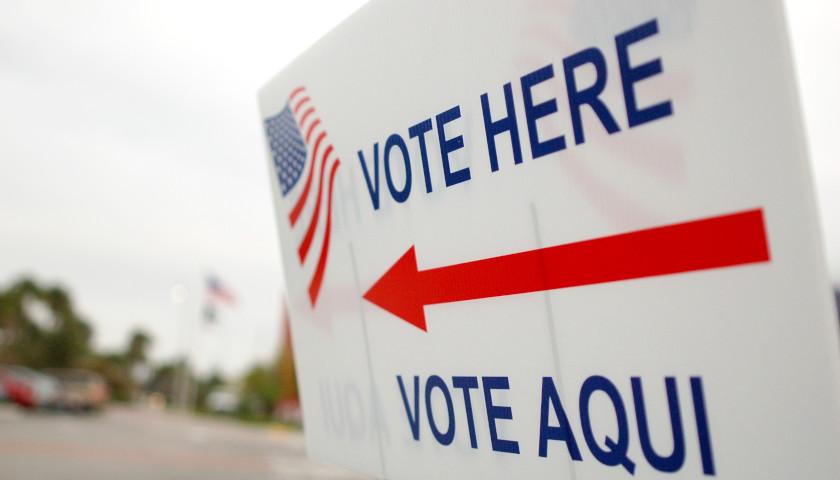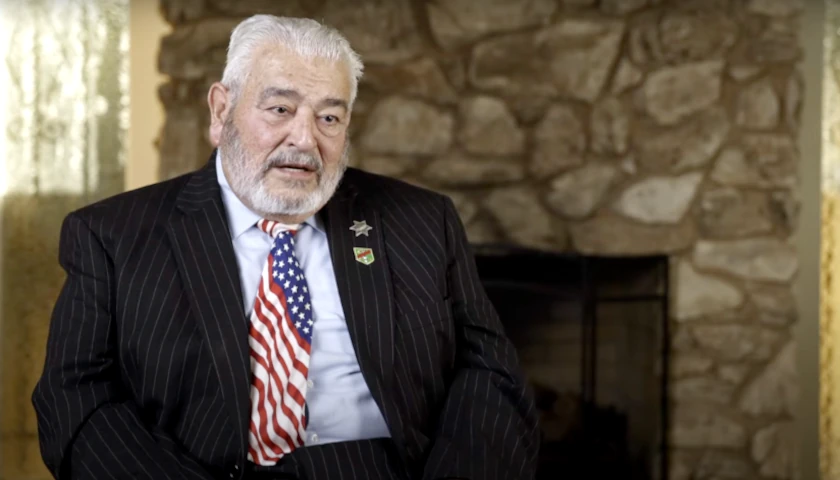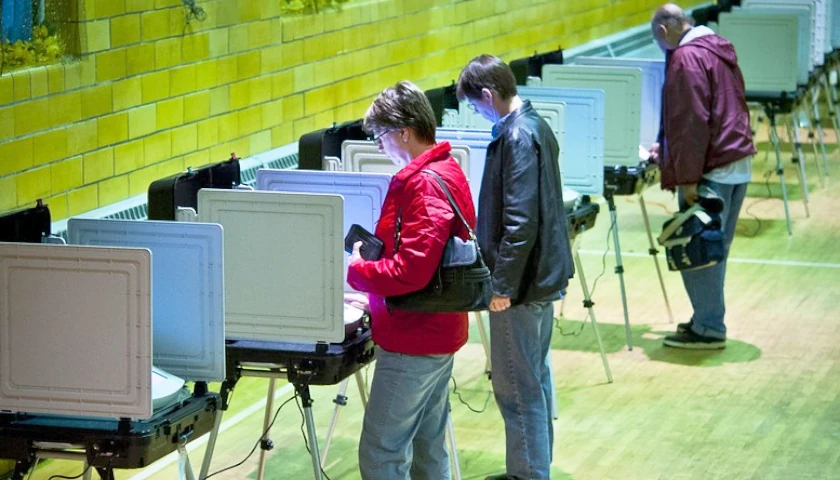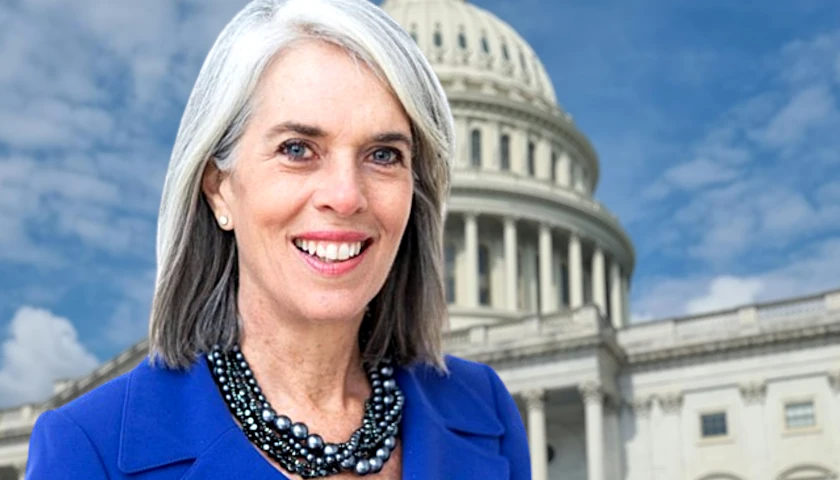An election integrity expert told The Tennessee Star that states need to start taking steps to prevent non-citizens from voting in their elections.
“I think states need to make it clear in their constitutions that you have to be a citizen to vote in all elections in the state to prevent local school boards, local town councils, and others from legalizing alien voting,” said Hans von Spakovsky, manager of the Election Law Reform Initiative.
“Alien” or “aliens” is the term used in federal immigration law that “refers to any person who is not a citizen or a national of the United States,” according to Cornell Law School.
In November, eight states – Idaho, Wisconsin, Iowa, Missouri, Oklahoma, Kentucky, North Carolina, and South Carolina – will hold ballot referendums to determine whether to prohibit non-citizens from voting in their elections.
Currently, only seven states explicitly prohibit non-citizens from voting: Alabama, Arizona, Colorado, Florida, Louisiana, North Dakota, and Ohio.
Von Spakovsky said that American citizens should care about these constitutional referendums because “every time someone who is not a U.S. citizen votes, it voids the vote of a citizen and disenfranchises U.S. citizens.”
He added that America doesn’t know the extent of the problem of non-citizens voting because states cannot do “much of anything to verify the citizenship status of individuals.” Despite this, von Spakovsky said that Americans have seen enough incidents that the country should be concerned about this topic.
Lauren Bowman, who is the director of communications for the Public Interest Legal Foundation, told The Star that non-citizens voting in local elections is a “huge problem.”
“The Left wants you to think it is not happening; it’s like Big Foot; it’s just a mythical creature,” she said.
Bowman said a concern she had when non-citizens can vote is how localities and states are maintaining these voter rolls.
“How are they keeping a separate voter roll? How are they keeping this data separate so it doesn’t get messed up? I think we have a lot of problems in our elections, as illustrated by the fact that by mistake, aliens are getting registered to vote. Why are we trying to add in more confusing layers to the system instead of fixing the errors in our election administration that currently exists? “ she said.
Bowman added that it is often not the fault of these non-citizens.
They will check on the voter registration form sometimes, ‘No’ I am not a United States citizen. And the election official will still register them to vote, so it’s not always a sinister plot. Sometimes it’s just government incompetence,” she said.
To illustrate, Pennsylvania admitted in 2019 that it had 11,198 noncitizens registered to vote. The same year, Texas said it found almost 100,00 non-citizens on its voter rolls.
Bowman said that the Public Interest Legal Foundation (PILF) has government records in states nationwide showing non-citizens “getting registered to vote and voting on a regular basis.”
She added that America needs to fix this because many local elections are very close races.
PILF has a database that tracks close elections. Its database shows 624 races that have ended up in ties and 159 races that have come down to one vote. Bowman said PILF compiles its database from news stories. According to Bowman, PILF started the database in 2023.
Bowman said that states “should pass a constitutional amendment” preventing non-citizens from voting in their state and local elections.
“It adds this protection to keep aliens from voting in American election[s]. What I call the ‘real foreign interference in American election[s]’ is allowing these foreigners to cast ballots in our election [s].
“Your local officials have a real impact on your daily life. They’re the closest to you. And I think that’s the worst part of this – it’s your school board, it’s where your children are going to school, it’s your property taxes for the locality,” Bowman said. “These are issues that impact your daily life in a big way.”
For example, in February, San Francisco voters elected Kelly Wong, a non-citizen from Hong Kong who came to America in 2019, to serve on its Elections Commission. Wong, who is not eligible to vote, came to America to pursue “graduate studies,” according to KQED.
Von Spakovsky said federal law prohibits non-citizens from registering and voting in federal elections. He also said that they are not allowed in most states to register and vote for state elections.
Jessica Vaughan, who is the Center for Immigration Studies’ Policy Studies director, told The Star if proponents succeed in getting non-citizens to vote on the local level, then that could leave the potential for federal elections to be “open to fraud.”
Eric Ruark, the director of Research at NumbersUSA, said that we know non-citizens are voting in federal elections. He said it happens “frequently.”
A May study from JustFacts found that between 10 percent to 27 percent of non-citizens are illegally registered to vote. The study put the number of non-citizens who are voting in America’s elections illegally between 2 million and 5 million people.
“The real question is, how many are voting? And the problem that we’re running into is, number one our federal government doesn’t want to know the answer, so they’re not tracking this. And more importantly, they’re not trying to take effective steps to prevent it,” Ruark told The Star.
“There’s no real enforcement because states are the ones who are conducting the federal elections,” he added. “But yet they’re not allowed to do certain things such as ensuring that it’s only citizens are voting, because the federal government is prohibiting them from doing that right now.
Von Spakovsky said that in many states, it is “unclear” whether the state’s policy of preventing non-citizens from voting applies to “local jurisdictions.”
Kentucky Law School professor Joshua Douglas, who “teaches and researches election law and voting rights,” said that state constitutions “affirmatively grant the right to vote.”
“Most say that ‘Every citizen shall be a qualified voter’ or ‘Every person may vote’ or something similar. This creates a floor — every citizen is a voter, but that does not mean that localities cannot go beyond that rule for their local elections,” the professor said in an email to The Star.
In America, three states — California, Maryland, and Vermont — allow non-citizens to vote in local elections. According to Shari Rendall, the State and Local Engagement director for the Federation for American Immigration Reform, 16 localities across those three states allow non-citizens to vote. In addition, Washington, D.C., also permits non-citizens to vote.
“Localities in places like California or Maryland, which give their localities the power of ‘home rule’ to create their own local rules for elections, can enfranchise noncitizens for their local elections if they want. That is, doing so does not violate the U.S. Constitution as there’s nothing in the Constitution that forbids the practice, and it does not violate the state constitution in states with state constitutional language that sets a floor for voter eligibility,” the professor said in an email.
According to Douglas’ 2017 paper called “The Right to Vote Under Local Law,” home rule “refers to the extent to which a state allows local jurisdictions to have local control.”
The professor said that the “key questions are whether the state constitution is still expansive and whether the state constitution and state legislation allow for home rule.”
“Change is easier at the local level and localities can experiment with rules to see how well they worked. That’s how many reforms have begun, including women’s suffrage and ranked choice voting. I’ve often said that if states are considered to be ‘laboratories of democracy,’ then cities and towns can be ‘test tubes of democracy’ that try things out on an even smaller scale,” Douglas told The Star.
Von Spakovsky said that “state governments in every state have complete control over all political subdivisions within a state whether it’s a county government, a city government, or a town government.”
“Those state legislatures can grant local governments with basically home rule to the extent they want them to,” von Spakovsky said. “But that doesn’t mean that the state legislature can’t at any time amend, take back, or change the amount of home rule they are allowing.”
Washington, D.C., has become a laboratory of democracy. In 2022, the nation’s capital allowed non-citizens to vote in local elections. The new law allowed anyone over the age of 18 and who has resided in D.C. for 30 days to be eligible to vote.
Von Spakovsky said, “That means that not only can individuals who are here illegally and breaking federal law as an alien can vote, it means that, if Vladimir Putin came to Washington and stayed in the Russian embassy for 30 days, he’d be able to vote in local elections. That makes no sense whatsoever.”
Director of Litigation at Immigration Reform Law Institute Chris Hajec is currently suing the D.C. Board of Elections to try to overhaul this law.
Hajec told The Star his clients, D.C. American citizen voters are having their rights infringed when D.C. allows non-citizens to vote. He added that his clients’ votes are being diluted by non-citizens’ votes.
Hajec is appealing his court case, Hall vs. D.C. Board of Elections, to the D.C. Circuit Court after the D.C. District Court dismissed it.
“It’s just a fundamental part of the theory of self-government that only citizens can vote,” he said. “And when you have a combination of mass immigration and letting aliens vote, you have the potential for a lot of the sovereignty of the American people being taken from them.”
Douglas, who does not advocate for this position but offers “expertise on the legality of the practice,” said that people who support non-citizens voting would say “that these individuals live in their communities and should have a say in, say, school board elections, especially as they legally send their children to school.”
Vaughan said that proponents of non-citizens voting are doing it for various reasons. She said people who push this idea “have something to gain politically,” whether that be “longevity in office” or they are doing something that “they think will please other immigrants in the community and get their support that way.”
Vaughan said that non-citizens do have representation through elected lawmakers, but they don’t choose who those lawmakers are.
“[Non-citizens] still have plenty of opportunity to make their views known to representatives, either through other advocacy groups or by writing letters or speaking with these representatives,” she said.
Rendall told The Star that when she goes out and talks to people in different states, their top concerns are the border crisis and illegal aliens voting in their elections.
“It’s important for Americans to have faith in the integrity of our elections, which includes that individuals who are not U.S. citizens aren’t voting,” Rendall said.
“A lot of change is made on the local and state level. We’ve seen that Congress has been stymied, and the states are taking action,” she said.
Von Spakoovsky added that he is confident that most states will pass their referendums in November. The election integrity expert said the only thing that could prevent them from passing is if the bills’ opponents fund deceptive “campaigns” to try to “con voters into thinking that they do something else.”
Since 2018, six ballot measures have all been approved by states saying non-citizens can’t vote in elections.
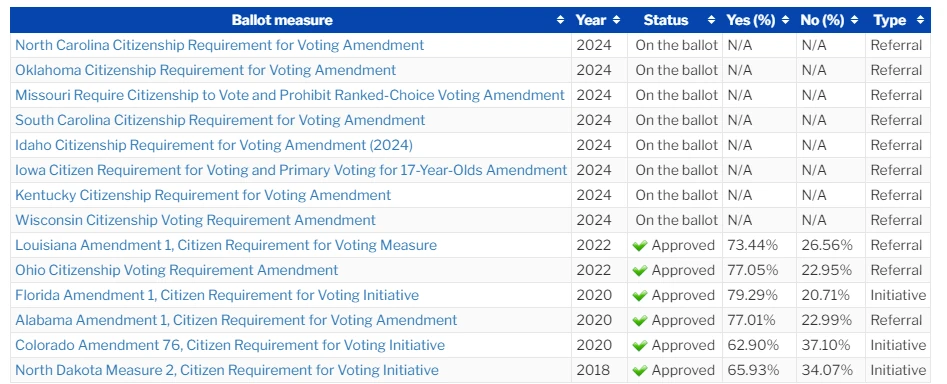
Vaughan said that when non-citizens are allowed to vote, it “dilutes the meaning of citizenship,” which is one of the last remaining differences between “citizens and non-citizens is the ability to vote.”
Von Spakoovsky said individuals who are not U.S. citizens “do not have the rights that Americans have, but they neither have the responsibilities that citizens have.”
“People always talk about people’s rights, but as citizens, we also have responsibilities we take on. Aliens don’t have those. And I don’t believe that they should have any say so in our election process and the way we go about choosing not only our representatives but passing the laws that govern our society.”
– – –
Zach Schmidt is the Senior Digital Editor at The Star News Network. Email tips to Zachery at [email protected]. Follow Zachery on Twitter @zacheryschmidt2.
Photo “Vote Here Sign” by Erik (HASH) Hersman. CC BY 2.0.

